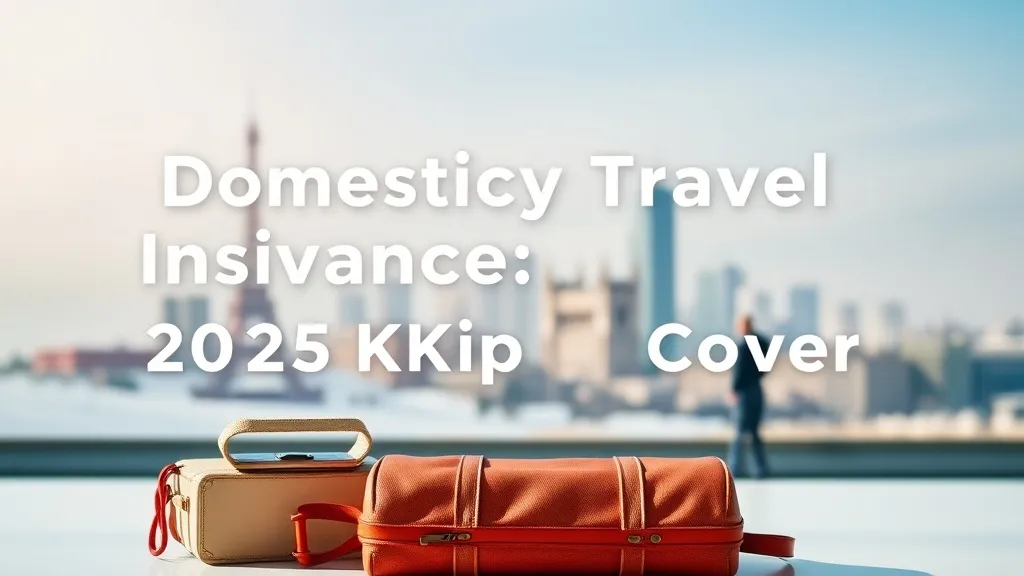Domestic Travel Insurance: 2025 UK Trip Cover
You know that sinking feeling when your UK staycation goes sideways? Whether it’s a last-minute cancellation or lost luggage on the train, domestic travel insurance can save the day. In fact, only 28% of UK travellers buy cover, yet the market hit £350 million in 2025. (UK Travel Insurance Association Q1 2025 Report) You’ll learn how domestic travel insurance works, the key benefits, and actionable steps to pick the right policy that fits your needs. Expect real examples, expert insights, and quick tips to make your next UK trip worry-free. Ready? Let’s dive in.
Table of Contents
- What Is Domestic Travel Insurance?
- Why You Need Domestic Travel Insurance in 2025
- Types of Domestic Travel Insurance Policies
- What Domestic Travel Insurance Covers
- How to Choose the Best Policy
- How to Make a Claim Quickly
- Future Trends in Domestic Travel Insurance
- Frequently Asked Questions
- 1. Do I need domestic travel insurance for a day trip?
- 2. Can I add Covid-19 coverage to my existing plan?
- 3. How much does domestic travel insurance cost?
- 4. Is pre-existing medical cover included?
- 5. What happens if my trip is delayed by a flood or strike?
- Conclusion
What Is Domestic Travel Insurance?
Imagine your holiday across the Scottish Highlands derailed by a medical emergency or a weather-related train delay. Domestic travel insurance protects against common disruptions within the UK. It’s not just a safety net—it’s peace of mind.
Domestic travel insurance is designed for trips that both start and end in the UK. Unlike international plans, it focuses on home-based emergencies, travel delays, and trip cancellations for UK holidays. Let me explain why it matters without the jargon.
“Domestic travel insurance is becoming increasingly vital as UK travellers seek peace of mind for unforeseen disruptions, especially with evolving health risks and travel regulations.” – Dr. Emma Clarke, Travel Insurance Analyst
Actionable takeaway: Check if your chosen policy covers your exact travel type—day trips, weekend breaks or longer stays. What Is Travel Insurance Coverage? 2025 Guide
Why You Need Domestic Travel Insurance in 2025
Ever had to cancel because of an unexpected illness? You’re not alone. Trip cancellation accounts for 35% of claims, while medical emergencies make up another 30%. The bottom line is simple—cover saves you money and stress.
With rail strikes, unpredictable weather, and Covid-19 still in the mix (12% of claims in 2024), it makes sense to add a safety blanket. Plus, insurers now offer Covid-19 coverage as standard, adapting to post-pandemic travel habits.
Actionable takeaway: Compare quotes early and lock in price protections if available.
Types of Domestic Travel Insurance Policies
Single-trip, annual multi-trip, or specialty modules—you’ve got options. So which fits your travel style?
- Single Trip: One holiday at a time. Ideal for infrequent travellers.
- Annual Multi-Trip: Covers unlimited UK journeys for a year. Suited for regular break-takers.
- Custom Modules: Pick and choose cover options (e.g., gear loss, car hire excess).
A real example: Jane from Cardiff saved £25 by switching from an international policy to an annual domestic plan. She travels once a month to visit family, so the multi-trip policy paid off in no time.
Actionable takeaway: Estimate annual trip count—if you plan three or more UK breaks, annual cover might be cheaper. Annual Travel Insurance: 2025 Multi-Trip Plans
What Domestic Travel Insurance Covers
Not all policies are created equal. The essentials usually include:
- Trip cancellation and curtailment
- Medical emergencies and hospital stays
- Lost, stolen or delayed baggage
- Travel delays and missed connections
Some insurers now offer eco-discounts if you choose train travel over flying. Interesting, right? Coverage limits vary—luggage cover could be as low as £500 or as high as £2,500.
“The trend towards customizable and Covid-19 inclusive policies reflects the changing needs of domestic travellers in 2025.” – James Thornton, CEO, SafeTrip Insurance
Actionable takeaway: Read the small print on limits and exclusions. Pay close attention to sections on pre-existing conditions and weather cancellations.
How to Choose the Best Policy
With dozens of providers vying for your premium, where do you begin? Start with a clear checklist.
- Define your trip type: single or multi.
- List must-have coverages: medical, baggage, cancellations.
- Compare excess amounts (the £ you pay before insurance kicks in).
- Check provider ratings and claim processing speed.
Expect to answer health questions and confirm travel dates. Keep copies of emails and policy documents handy—digital or print. Nearly 18% of UK holidaymakers in 2024 felt rushed choosing cover. Don’t be one of them.
Actionable takeaway: Spend 10 minutes reading policy FAQs—then decide.
How to Make a Claim Quickly
You’ve faced a hospital stay in Wales and need to claim medical fees. What now?
First, report the incident within the insurer’s deadline—often 24 to 48 hours. Gather proof: medical reports, travel tickets, receipts. Then log the claim online or via the app. Many providers now use AI to push through simpler claims in under 48 hours.
- Step 1: Notify insurer by phone or app.
- Step 2: Upload supporting documents.
- Step 3: Monitor claim status online.
- Step 4: Appeal if needed before 30 days.
Actionable takeaway: Keep all original receipts and do not throw away cancelled tickets—photos count too.
Future Trends in Domestic Travel Insurance
Sustainable travel discounts are on the rise. Expect more AI-driven underwriting, dynamic pricing based on real-time risk, and deeper Covid-19 integrations (testing reimbursements, telemedicine cover). Simply put, domestic travel insurance will get smarter and greener.
Frequently Asked Questions
1. Do I need domestic travel insurance for a day trip?
Yes—if you want protection against cancellations, missed connections, or medical emergencies, even short UK trips warrant cover.
2. Can I add Covid-19 coverage to my existing plan?
Many insurers now include Covid-19 automatically. If yours doesn’t, you can often purchase an add-on for test, treatment, or quarantine costs.
3. How much does domestic travel insurance cost?
Typically between £5–£20 per trip, depending on duration, cover levels, and traveller age.
4. Is pre-existing medical cover included?
Often not. Declare any health conditions upfront or purchase a medical screening add-on to avoid denied claims.
5. What happens if my trip is delayed by a flood or strike?
Delays due to external events are usually covered—check your policy’s delay duration threshold (commonly two hours).
Conclusion
Domestic travel insurance turns unexpected emergencies into manageable hassles. You’ve seen the key benefits of trip cancellation, medical and baggage cover, and learned how to compare providers and file a claim quickly. To safeguard your next UK holiday:
- List your essential cover needs and trip frequency.
- Compare policies for limits, excesses, and extras.
- Keep documentation handy and report incidents promptly.
Now you’re set. Embrace your next UK adventure with confidence—and remember, domestic travel insurance is your ticket to worry-free exploration. Let the journey begin!
External resources: Association of British Insurers, UK Government Travel Insurance Guidance.





